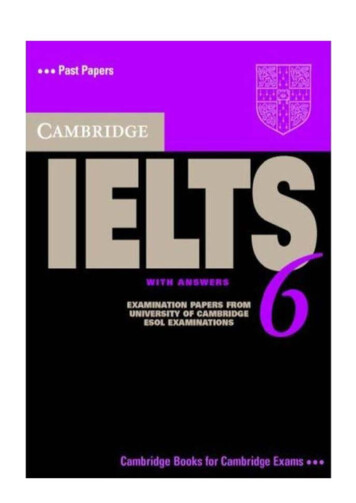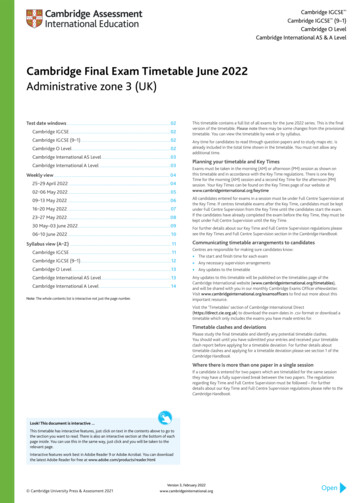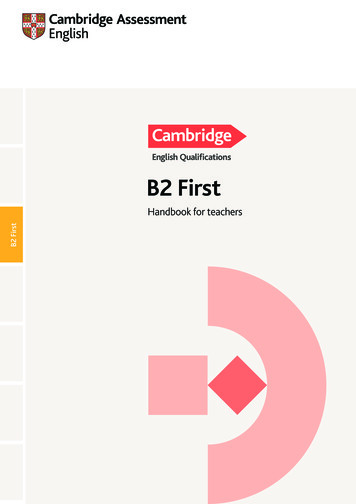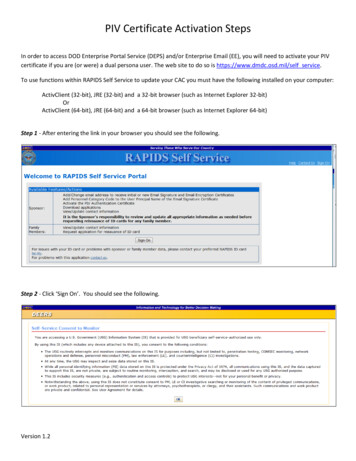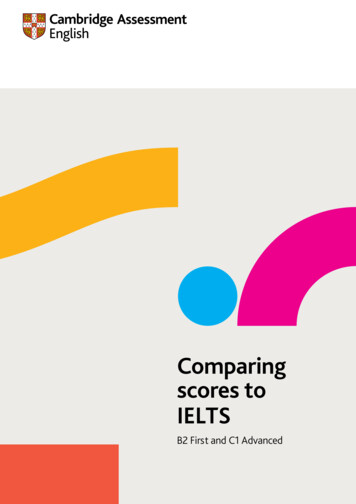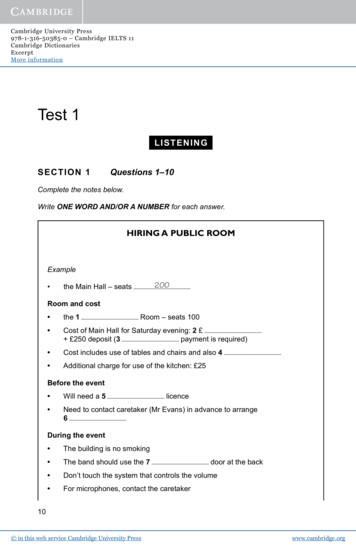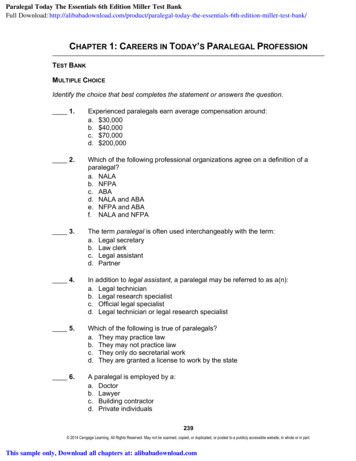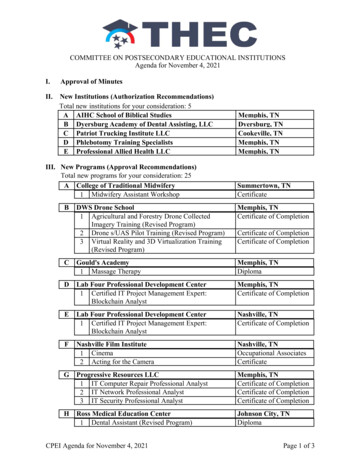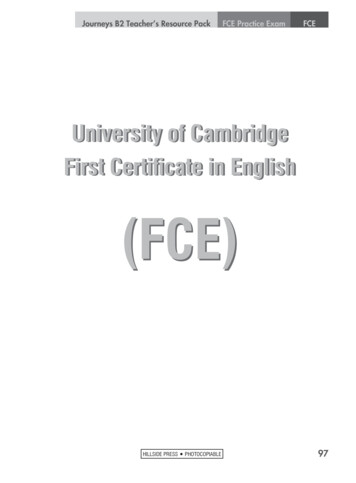
Transcription
Journeys B2 Teacher’s Resource PackFCE Practice ExamFCEUniversity of CambridgeFirst Certificate in English(FCE)HILLSIDE PRESS PHOTOCOPIABLE97
ReadingFCE Practice ExamJourneys B2 Teacher’s Resource PackPaper 1: Reading (1 hour)Part 1You are going to read an extract from a novel. For questions 1–8, choose the answer (A, B, C or D)which you think fits best according to the text.The bus was crowded with tourists, most of whom, like us, were unfamiliar with local customsand probably unsure of which stop to get off at. It was the middle of summer, and we werealready hot and tired, even though it was still morning. The bus had no air conditioning and,as there weren't any free seats, we'd been standing for at least twenty minutes as therusty old vehicle made its way along the winding, bumpy roads. It was an effort for us tokeep our balance and not fall down or bump into other passengers as the bus went roundsharp bends or swerved to avoid the numerous holes in the road.Because there were so many people around us, it was difficult to see out of the windows,so we weren't quite sure where we were. Thinking, after the bus had crossed a bridge, thatwe had reached the ancient site that we wanted to visit, we pressed the button by the doorto let the driver know that we wanted to get off at the next stop. When the bus stoppedand the doors opened, however, we realised that the site was still a long way off, and sowe stayed on board. No one got off the bus. The doors closed and the bus set off again.Just before the next stop, another passenger must have pressed the button, because, onreaching the stop, the bus once more came to a noisy halt and the doors opened with aloud rattle. However, once again, no one got off. We had been too busy chatting to seeline 17 who it was who had pressed the button and, unaware of our predicament, we continued ourconversation. However, after a few moments, we realised that the bus hadn't set off again.Sensing that something was wrong, all the passengers turned and looked in the direction ofthe driver.To our horror, the enormous bus driver had got out of his seat, obviously with some effort,since he was bright red, and was heading straight towards us with a face like thunder.He stopped a few metres from us and started shouting at the top of his deep, boomingvoice. His voice matched his expression perfectly. Perhaps fortunately, we didn't speak thelanguage, so we understood nothing of what he was yelling. We realised that he was angrywith us because the button had been pressed twice, forcing him to stop the bus for noreason since nobody had got off. Sorry, sorry,' I said, trying to sound as apologetic as possible, and with a pained expressionon my face. We're really sorry,' my friend added, but we only did it once. It wasn't us the second time.It must have been someone else. We weren't sure where to get off, you see and .'Her voice gradually trailed off as she saw the blank look on the bus driver's face. There wasobviously no reason to continue. He looked even angrier than before – if that was possible.Still fuming, he turned round and got back into his seat. The bus set off again. We thoughtit wise to move away from the door so that we wouldn't be blamed if someone pressed thebutton a third time. We were pretty sure that if it happened again, we would be physicallyline 37 thrown off the bus - at best!Eventually, we arrived at our destination, not a moment too soon, we felt, and we got offthe bus with a great sense of relief. As the vehicle moved off, we could just make out,through the cloud of dust that it left behind, a group of boys who were standing at therear window. They were looking at us and laughing. We wondered if we had been the victimsof a practical joke. Oh, well, let's just hope we don't get on the same bus on the way back!' my friend remarkedas we headed for the wonders of the ancient ruins which were still some way ahead of us.98HILLSIDE PRESS PHOTOCOPIABLE
Journeys B2 Teacher’s Resource PackFCE Practice ExamReadingPart 11 What do we know to be true about the passengers onthe bus?A Some of them hadn’t had to pay for their seats.B They were all tourists.C They kept on bumping into each other.D Not all of them knew the route they were on.2 Why weren’t the writer and her friend sure aboutexactly where they were?5 Why did the writer’s friend’s voice gradually trail off?A The bus driver looked even angrier than before.B She expected the writer to say something.C The bus driver realised what had happened.D She realised the bus driver didn’t understandEnglish.6 How did the writer and her friend make sure that theydidn’t make the driver even angrier?A The windows of the bus were dirty.B It was dark outside.C They had never been to the area before.D The bus was crowded.A They kept their distance from the door.B They got off the bus.C They went to the rear of the bus.D They spoke to him.3 What ‘predicament’ is referred to in line 17?A They didn’t have bus tickets.B They were on the wrong bus.C They didn’t know where to get off the bus.D The bus driver was angry with them.7 Why does the writer say ‘at best’ in line 37?A Getting thrown off the bus was the worst-casescenario.B The driver might do something worse thanthrowing them off the bus.C The bus driver would be justified in throwing themoff the bus.4 Why does the writer say, ‘fortunately, we couldn’tspeak the language’?A They didn’t have to explain to the bus driver whathad happened.B They didn’t need to speak to the driver, and theycouldn’t have, anyway.C They didn’t want to know what the bus driver wassaying.D The other passengers couldn’t understand whatthey had been saying.D Someone else might get into trouble this time.8 What ‘practical joke’ did the boys probably play on thewriter and her friend?A They made sure that the writer and her friend gotcovered in dust.B They pressed the button the second time,knowing that the writer would get the blame.C They arranged for the writer and her friend to getoff the bus a long way from the ancient site.D They made sure that the writer and her friendwouldn’t find anywhere to sit on the bus.HILLSIDE PRESS PHOTOCOPIABLE99
ReadingFCE Practice ExamJourneys B2 Teacher’s Resource PackPart 2You are going to read an article about a woman who is a marathon swimmer. Seven sentences havebeen removed from the article. Choose from the sentences A–H the one which fits each gap (9–15).There is one extra sentence which you do not need to use.Marathon SwimmerSharon Rose tells of her experiences as a marathon swimmer.For as long as I can remember, I have been swimming.9My brother, Mike, who was then nine, trainedfive days a week with the local swimming team, so Isoon got used to the idea that competitive swimmingwould be part of my life too.Mike was excellent at the sprints, the 50-metre and100-metre races. Joining the world of competitiveswimming, I began to realise that, while I didn’t have theedge for such bursts of speed, I had plenty of strengthand stamina for the 800-metre and 1,500-metreWhen we were scheduled for differentevents. 10competitions on the same day, my father took one ofus to the other venue.Mike managed to get a gold in the nationalchampionships, but then he gave up racing for waterpolo, a move that my father really seemed to approveof. Since then he has obtained a place on the nationalpolo team and taken part in quite a few internationaltournaments.Marathon swimming usually takes place in the sea or inlarge lakes. One of the most popular races is the 10-kmrace, but some other distances are 1 mile, 5 km and 10miles. Marathon swimming has been popular amongendurance athletes since the early 1990s, and the 10-kmrace became an Olympic event at the Beijing Games in 2008.12Participants raced one kilometre down one sideof the basin, round a marker buoy and a kilometre up theother side, then round the same course another four times.Daisy warned me that the world of marathon swimmingwas very different from the swimming that I knew. Oneof the most obvious differences is the temperatureof the sea or a lake compared to a heated pool.Other notable difficulties include waves and currents,seaweed, floating rubbish (imagine swimming alongand bumping into a dead dog), fumes from escortboats, jellyfish and other marine life. 13Marathon swimmers need quite a tough attitude too.14There is always a danger that some are temptedto kick, grab, push or pull when they believe that othersare doing the same to them.11I suppose I have simply become accustomedto working on my own, and having to rely on what Ican achieve for myself. I was actually making a namefor myself in the 1,500-metre freestyle races, where itwas becoming rare for me not to finish in one of thefirst three places. Then one day Daisy, who is my e-palfrom Australia, told me that she had become hookedon marathon swimming.I’ve taken part in several events now, some of theminternational ones, and my successes are giving meIn training, I swim aboutan appetite for more. 1590 kilometres a week, though mostly in a pool. Bestof all, I sometimes compete in events where Daisy isswimming too.A Swimmers have even been known to be joined byE It certainly needs a lot of preparation.whales!F My mother spent a lot of weekends taking Mike andB I, on the other hand, am much less interested inteam sports.me to competitions in different towns and cities.G I was three years old when I learnt to swim at ourC They end up swimming in packs which can be quite atangle of arms and legs when they turn at the buoys.local pool.H There, the course was set in the rowing basin.D Although, on this occasion, the race took place in astandard swimming pool.100HILLSIDE PRESS PHOTOCOPIABLE
Journeys B2 Teacher’s Resource PackFCE Practice ExamReadingPart 3You are going to read a magazine article about people who have unusual houses. For questions 16–30,choose from the people (A–D). The people may be chosen more than once.Which personhas a different home fairly frequently?16may be in different places without a change of home?17was forced to have a certain type of home because of regulations?18has to let in certain people sent by the owner of the property?19has received official recognition or praise for their home?20uses their home for business purposes?21lives in a building designed for a specific job?22used to earn a lot of money?23really appreciates being close to nature?24does repair and maintenance jobs on their home as part of their work?25would appear to have opportunities for luxury recreational activities?26must find the internet a very important tool at times?27is qualified to design homes?28would appreciate better heating?29is thinking about changing their career?30HILLSIDE PRESS PHOTOCOPIABLE101
ReadingFCE Practice ExamJourneys B2 Teacher’s Resource PackPart 3Unusual HomesA Miriam Rees lives in a lighthouse on the westcoast of Scotland. Even though the lighthouseis still in use, it does not have a keeper becauseeverything is automated. Rees rents the livingquarters and some of the storerooms, and theonly condition is that she has to allow access tomaintenance engineers any time they visit. This isno hardship, since they are rarely needed.R ees really appreciates the fact that she is livingclose to nature and far from city crowds. She loveswatching the local wildlife, and she is an artist,so she enjoys having time and opportunities forpainting. When she wants human contact, shesimply logs on to the Net. She also uses this toorder supplies from the nearest harbour, whichshe then collects using her own boat. Rees admits that her lifestyle would not suiteverybody, but claims that it is bliss for her.B Larry Hale has a boat that is both his home andworkplace rolled into one. He used to be a deepsea fisherman, but changed his lifestyle when itbecame clear that the fishing industry was in dangerof wiping out the oceans’ fish stocks. Fishing can bea dangerous but rewarding occupation, and Halehad made a lot of money over the years. However,he is now much less wealthy, so he has sold hishouse and kept the boat. Hale earns some moneyby taking people on whale watching trips or otherwildlife-related excursions. Now that everything he owns is on the boat, hehas to be very tidy, otherwise there would be noroom to move around in. He is used to living onhis boat, he says, though he does admit to findingit hard to cope with the cold on the worst winterdays. Nevertheless, he claims that the lifestylesuits him, especially the freedom to be whereverhe wants.102C Ruth Mars is an architect, and one of her mostamazing projects at the moment is her ownhouse. She originally wanted a chalet in themountains, but after buying a large plot on amountainside in a remote area, she discoveredthat she could not get official permission to builda house there. After a lot of discussion with theplanning authorities, she got a licence to build herhome in a cave that was in the mountainside. Professionally, this presented Mars with anenormous challenge. She would not have agreedif she had not been permitted to include somelarge windows in the design, and she is proudto report that this has been achieved without thewindows even being noticeable to casual visitorsto the area. Mars put a great deal of thought intohow she could make the best use of the spaceavailable, and is certainly pleased that the positionof the house in the earth and rock means that it iseasy to heat. What is more, she has won awardsfor her house, and is now getting some excitingnew projects to work on.D Karl Krenz is a professional housesitter. He isemployed by an agency that provides people to livein the holiday villas of wealthy people who do notwant to leave their properties unoccupied for longperiods of time. Usually, the important thing for theclient is that their house looks lived in. Obviously,the property needs to be kept clean and tidy, andsometimes the owner asks for skilled work to bedone where necessary. Krenz is actually a qualifiedelectrician who can also undertake plumbing anddecorating jobs, so he is in high demand. The downside of this job, apart from not havinga home you can call your own, is that it is rare forthe client to permit more than one or two people tooccupy the house. However, these houses oftenhave luxury facilities like saunas, swimming pools andgames rooms. Krenz tends to view his assignmentsas extended holidays with responsibility included. He takes his work very seriously. However,although it is a job that he enjoys, he is consideringfinding a new line of work so that he can settledown and make a permanent home for himself.HILLSIDE PRESS PHOTOCOPIABLE
Journeys B2 Teacher’s Resource PackFCE Practice ExamWritingPaper 2: Writing (1 hour 20 minutes)Part 1You must answer this question. Write your answer in 120–150 words in an appropriate style.1 You have received an email from your English-speaking friend, Martin, who is planning to gocamping for the first time. Read Martin’s email and the notes you have made. Then write anemail to Martin, using all your notes.From: Martin GrigorevichSent: 2nd AprilSubject: camping tripHow are you?You’ve often told me about your camping holidays, and how much you and yourfriends enjoy them. Well, a friend and I have decided that we’d like to visit yourcountry for our first ever camping holiday.No,because Great idea!We’d like to know the best areas to go to for this type of holiday. We could go to anofficial campsite or simply find a suitable place in the countryside. Which do youthink would be better?Say whichand why.Also, can you give me some advice about the equipment and clothing that we’ll need?Suggest We’re planning to come in July, and it would be great if we could meet up with you.Will this be possible?Write back soon.MartinWrite your email. You must use grammatically correct sentences with accurate spelling and punctuation in astyle appropriate for the situation.HILLSIDE PRESS PHOTOCOPIABLE103
WritingFCE Practice ExamJourneys B2 Teacher’s Resource PackPart 2Write an answer to one of the questions 2–5 in this part. Write your answer in 120–180 words in anappropriate style. Put the question number at the top of the page.2 You recently saw this notice in an English-language magazine called The Bookworm’s Friend.OPINIONS WANTED!Have you been greatly impressed or disappointed by a work of fiction you recentlyread? If so, send us a review of the book. Include information about the plot andcharacters, and say whether you would recommend this book to others.The best reviews will be published in our next issue.Write your review.3 You have seen this announcement in your school magazine.An Amazing Leisure ActivityDo you do a leisure activity that you would like to recommend to others? Write anarticle telling us about it. Say what the activity is, why you like it and who you wouldrecommend it for.We will publish the three most interesting articles.Write your article.4 You have decided to enter a short story competition in an English-language newspaper.The story must begin with the following words:Vera knew that it would be very dangerous, but she had to help her friends.Write your story.5 Answer one of the following two questions based on your reading of one of the set books.(a) This is part of an email from your English-speaking e-pal. I really enjoyed the book that you sent me. I’d love to have some adventures like theones the main characters experienced. Would you like to experience any adventureslike theirs? Why/Why not?Write an email to your friend to answer these questions.Write your email.(b) You see the following notice at the end of a magazine article about a popular novel. People might say that, although the main character changed in some ways duringthe story, not all of those changes were positive. Write an article, saying whether you agree with this or not, and why. The best articlewill be published in this magazine.Write your article.104HILLSIDE PRESS PHOTOCOPIABLE
Journeys B2 Teacher’s Resource PackFCE Practice Exam Use of EnglishPaper 3: Use of English (45 minutes)Part 1For questions 1–12, read the text below and decide which answer (A, B, C or D) best fits each gap.There is an example at the beginning (0).Example:0 A loverB friendExample:0C sympathiserD fanA B C DnoooCANINE CLEANLINESSFiona MacGregor had always been a dog (0), but she had never actually(1)any thought to seeking work that was related to this passion. (2),after leaving school, she had studied economics and business at university, and thenworked for a large company. After about fifteen years, (3), she, along withthousands of others in (4)jobs, suddenly found herself out of (5)whenthere was a downturn in the economy.that her only option was toFinding it impossible to get any work, Fiona (6)(7)her own business, and (8)could be better than doing a job she loved?Of course, her first task was to (9)out a market survey in the town where shelived in order to find out how much (10)there was for the kind of service shewas planning to offer.The results were quite promising, so, with a small loan, she got herself a littlewith a large plastic bath. She soon had a long list ofvan which she (11)customers whom she visits to wash their dogs. As a result, Fiona is now both(12)money and having fun!1 A spentB acquiredC madeD given2 A LogicallyB ThereforeC NeverthelessD Seemingly3 A howeverB althoughC despiteD considering4 A sameB equalC alikeD similar5 A occupationB positionC workD job6 A noticedB realisedC accountedD finalised7 A stand forB make outC set upD make up8 A whichB whatC whicheverD whatever9 A carryB sendC workD sort10 A wantB requirementC requestD demand11 A organisedB suppliedC equippedD arranged12 A findingB makingC gatheringD gainingHILLSIDE PRESS PHOTOCOPIABLE105
Use of English FCE Practice ExamJourneys B2 Teacher’s Resource PackPart 2For questions 13–24, read the text below and think of the word that best fits each gap.Use only one word in each gap. There is an example at the beginning (0).Write your answers IN CAPITAL LETTERS.Example:0whoThe Brothers ChurchillWinston Churchill, (0)was prime minister of the UK from May 1940 towhoJuly 1945, famously led Britain to victory in the Second World War (WWII), and has(13)called the greatest Briton ever. (14)is not so well known,however, is the quiet, yet important role played (15)his younger brother,Jack. Indeed, one author even wrote (16)Winston was an only child!Although Winston, following (17)his father's footsteps, was involvedin politics for most of his life, Jack was not. Nevertheless, in other respects,(18)lives were very similar. They both fought in South Africa duringthe Boer War in 1900, where they showed extreme bravery. They both also fought(19)their country during the First World War (WWI). Noted for his greatorganisational skills, Winston was in charge (20)the Royal Navy at thestart of both world wars. Jack, on the other hand, served in the army throughoutWWI.his regular job, Jack also worked on a daily basisDuring WWII, in addition (21)(22)Winston's private secretary, in (23)of having serioushealth problems himself. Although he has been largely ignored by the history books,helped his brother, andJack's valuable skills and companionship must (24)therefore the country, considerably during this extremely difficult period.106HILLSIDE PRESS PHOTOCOPIABLE
Journeys B2 Teacher’s Resource PackFCE Practice Exam Use of EnglishPart 3For questions 25–34, read the text below. Use the word given in capitals at the end of some of the lines toform a word that fits in the gap in the same line. There is an example at the beginning (0).Write your answers IN CAPITAL LETTERS.Example:0elderlyHelp at HomeThe Halport Home Helpline has been providing the (0)elderly,ELDERand others with permanent or temporary health problems with support and(25)ASSISTsince 1999.We are a charitable (26)ORGANISEthat depends on the manyvoluntary workers from Halport who willingly set aside some of their free time to helppeople who are less (27)than themselves. For peoplewho, because of ill health or (28)ABILITY, require help withhousework, (29)FORTUNE, or trips to the hospital or health centre,SHOPwe are only a phone call away, any time of the night or day.All of our volunteers, aged from 18 to 80, have a (30)inQUALIFYfirst aid and have undergone rigorous tests before being awarded a(31)with which Halport Home Helpline guaranteestheir reliability and (32)for the job.So, whatever your problem, (33)of how big or small itCERTIFYSUITABLEREGARDmight be, don’t hesitate to call and let us know how we can help you. We areworking to (34)community ties in Halport, and to makeSTRONGour town a better place for all its residents.HILLSIDE PRESS PHOTOCOPIABLE107
Use of English FCE Practice ExamJourneys B2 Teacher’s Resource PackPart 4For questions 35–42, complete the second sentence so that it has a similar meaning to the first sentence,using the word given. Do not change the word given. You must use between two and five words, includingthe word given. Write your answers IN CAPITAL LETTERS. Here is an example (0).Example:0 One of my friends took the children home.TAKENThe childrenExample:0friend of mine.were taken home by a35 It wasn’t necessary for you to brake so suddenly.STOPPEDYouthe car so suddenly.36 But for your warning, I would have had an accident.GIVEN Ifthat warning, I would have had an accident.37 We got there quite early, even though we started our journey late.SPITE We got there quite earlyoff on time.38 I bought this car from a doctor.BYThis cara doctor.39 In the end, they cancelled the party because of the storm.CALLEDIn the end, the partyto the storm.40 It would have been better if you had accepted her offer.NOTYou oughtdown her offer.41 Jenny didn’t seem to want to help her sister.KEEN Jenny didn’t seem to be veryher sister a hand.42 I was just about to reveal the secret when Ted walked in.POINT When Ted walked in, I was108the cat out of the bag.HILLSIDE PRESS PHOTOCOPIABLE
Journeys B2 Teacher’s Resource PackFCE Practice ExamListeningPaper 4: Listening (approximately 40 minutes)Part 1You will hear people talking in eight different situations. For questions 1–8, choose the best answer, (A, B or C).1 You hear a young man talking about bungee jumping.Why did he make his first jump?5 You hear a teacher talking to some students.What does the teacher place most emphasis on?A His friends persuaded him that he’d enjoy it.A how much information to gather for their projectB He knew he had to get over his fears.B what sort of information to gather for theirC He wanted someone’s admiration.projectC what to do with the information they’vegathered for their project2 You overhear a conversation.What do you learn about the man’s children and theirouting?6 You hear a doctor talking to a patient.What does the doctor want the patient to do?A They were very frightened at times.A take vitaminsB They got really dirty.B go on a dietC They were running around all day.C be more active3 You hear a woman talking.What do you learn about her new neighbours?7 You overhear a man speaking on the phone.How does the man feel?A They’ve got naughty children.A gratefulB They try to include her in the community.B annoyedC They make too much noise.C disappointed4 You overhear a conversation.8 You hear two people talking about a girl.How does the man feel about shopping?How did the girl act at the dentist’s?A It can be fun as well as informative.A She shouted a lot.B It’s the best way to meet people socially.B She cried a lot.C It’s important to find the best bargains.C She was calm.HILLSIDE PRESS PHOTOCOPIABLE109
ListeningFCE Practice ExamJourneys B2 Teacher’s Resource PackPart 2You will hear a journalist’s description of school life in a village when he was young.For questions 9–18, complete the sentences.THE VILLAGE SCHOOL9 covered in grass.The school had a large10 in one of the modern extensions.The children could eat11 in the sameIn lots of village schools, teachers taught children from differentclassroom.12 in both hands while theyThe speaker used to admire children who couldcycled to school.13 there.The girls liked to play games on the tarmac or hold14 that he took a lot of pride in.The owner of the cottage next to the school had a15 next to it.There was a steep drop from the playground wall to the16 of the watermill.The children interviewed theOn snowy days the children used to polish the snow until they had slides made of17 .When snow prevented the high school kids from going to school, they used to visit the village school to take part in18 with the children there.110HILLSIDE PRESS PHOTOCOPIABLE
Journeys B2 Teacher’s Resource PackFCE Practice ExamListeningPart 3You will hear five different people talking about experiences in boats.For questions 19–23, choose from the list (A–F) what each speaker says.Use the letters only once. There is one extra letter which you do not need to use.A We got a lot of exercise!B We didn’t really go anywhere!C Our boat sank to the bottom of the sea.D We went on a boring trip.E We hadn’t planned to travel by boat.F The boat moved even though we weren’t using the oars.Speaker 119Speaker 220Speaker 321Speaker 422Speaker 523HILLSIDE PRESS PHOTOCOPIABLE111
ListeningFCE Practice ExamJourneys B2 Teacher’s Resource PackPart 4You will hear an interview with a mature student called Jessie Jolly. For questions 24–30, choose the bestanswer (A, B or C).24 Jessie wanted to become a student because sheA no longer liked being a judge.B felt the need to do something different.C is too old to be a judge.25 Jessie has chosen subjects thatA have interested her for a long time.B she has taken classes in before.C mainly concern mental health.26 W hat sums up the reactions of other students?A Generally, they have helped Jessie to fit in.B Jessie was right to be concerned about what their reactions might be.C They have accepted Jessie more easily than her tutors have.27 What does Jessie think about the intellectual side of being a student?A She is not as intellectual as some of the younger students.B She has skills and experience that can help her with this.C She usually needs to get help and opinions from some of the better students.28 W hat do we learn about Jessie’s tutors?A They prefer not to emphasise her strengths.B They probably won’t set her very challenging exams.C They help her work out where she needs to improve.29 What is true about Jessie’s social activities as a student?A She mixes socially with students of different educational interests.B She doesn’t do any physical exercise.C She is one of the best cooks among the students.30 Jessie’s final comments show that sheA feels that she has already done more than enough for others.B wants to do something useful for others.C has a low opinion of modern society.112HILLSIDE PRESS PHOTOCOPIABLE
Journeys B2 Teacher’s Resource PackFCE Practice Exam SpeakingPaper 5: Speaking (14 minutes)Part 2Student A Why do you think people enjoy doing these sports?Student B What do you think the attractions of these forms of entertainment are?HILLSIDE PRESS PHOTOCOPIABLE113
Speaking FCE Practice ExamJourneys B2 Teacher’s Resource PackPart 3 In what ways can these ideas improve the neighbourhood for local people? Which idea is the best?114HILLSIDE PRESS PHOTOCOPIABLE
Journeys B2 Teacher’s Resource PackFCE Practice ExamSpeaking – Teacher’sPart 13 minutes (5 minutes for groups of 3)Interlocutor:Good morning/afternoon/evening. My name isAnd your names are?First of all, we’d like to know something about you. Where do you live (Student A)? And you (Student B)?and this is my colleague,. What can you tell us about living there? And what about you?Select one or more questions from any of the following categories, as appropriate.Likes and Dislikes What are/were your favourite subjects at
Reading FCE Practice Exam Journeys B2 Teacher’s Resource Pack Part 2 A Swimmers have even been known to be joined by whales! B I, on the other hand, am much less interested in team sports. C They end up swimming in packs which can be quite a tangle of arms and legs when they turn at the buo
